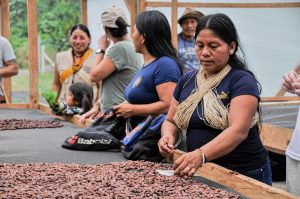 -Editorial
-Editorial
American Community Media, in partnership with the South Asian Literary Association, held a panel discussion with Nobel Laureate Dr. Abhijit Banerjee, who spoke on the urgent need to restructure global aid to truly benefit the world’s most vulnerable communities.
Professor Banerjee was awarded the 2019 Nobel Prize in Economics, alongside his wife Dr. Esther Duflo, and Dr. Michael Kremer, for pioneering the use of randomized controlled trials in development economics. He has transformed how policymakers and governments understand poverty alleviation.
His groundbreaking research, from demonstrating the power of simple interventions like school-based deworming in Kenya to the effectiveness of offering free lunches In India to encourage children to attend school, has reshaped the global fight against poverty and redirected billions of dollars toward programs proven to work.
Dr. Banerjee, delivered an assessment of the global aid landscape, underscoring how recent U.S. policy shifts are reshaping international development and threatening hard-won progress against poverty.
He began by noting the dramatic repositioning of U.S. aid priorities over the past several months. Reductions in the U.S. aid envelope, coupled with Washington’s pressure on allies such as the UK and France to increase defense budgets, have led those nations to scale back their own aid contributions. This cascade of retrenchment, he argued, has created a “knock-on effect” that jeopardizes decades of development gains.
Banerjee stressed that the two decades before the pandemic were remarkably successful for the world’s poorest populations. Extreme poverty fell substantially, maternal and infant mortality dropped sharply, and school participation increased globally—particularly for girls, who now often surpass boys in enrollment. He emphasized that these achievements provide important context: the global fight against poverty was making real progress, and the current aid cuts risk undermining this trajectory.
The impact will be felt most immediately in very poor countries where foreign aid makes up a significant portion of government budgets. In such states, cuts translate directly into reductions in social investment programs, with no alternative funding available. More broadly, fragile states such as Syria, South Sudan, Somalia, and the Democratic Republic of Congo face worsening humanitarian crises, driven by conflict and climate shocks. In these regions, millions of children already live on the brink of starvation, and reductions in food aid, combined with the collapse of local NGOs that depend on international support, could lead to immediate loss of life.
Banerjee also highlighted the global health risks tied to the scaling back of two cornerstone initiatives: PEPFAR, which funds HIV treatment in low-income countries, and Gavi, which supports worldwide vaccination. Both programs had long benefited from bipartisan U.S. backing, but that support is now uncertain. He warned that the withdrawal of funds would likely result in preventable deaths from HIV/AIDS and vaccine-preventable diseases.
He lamented the dismantling of U.S. agencies that supported innovation and evidence-based policymaking, such as USAID’s Development Innovation Ventures program and its research department, both of which fostered effective development solutions. Climate programs have also been effectively abandoned at the federal level, eliminating another critical avenue of support for vulnerable populations.
Looking ahead, Banerjee posed the question of whether other actors might step up. Norway and Spain have modestly increased their aid budgets, but their contributions are small compared to the scale of U.S. funding. China has begun providing targeted aid, while India and Brazil, both middle-income nations seeking global influence, could potentially play larger roles in humanitarian assistance. Still, he noted, replacing the U.S. remains extraordinarily difficult.
Banerjee concluded with a striking reminder: the issue is not a lack of resources but of will. He pointed out that just 1% of the wealth held by the world’s 3,000 richest individuals, amounting to roughly $140 billion, would be enough to offset the lost aid.
In a lighter discussion, Kiran Malhotra, co-founder of the South Asian Literary Association (SALA) and director of Art Forum, described the sixth annual SALA Festival as a vibrant celebration of South Asian voices across literature, art, film, poetry, and food. She emphasized that while deeply rooted in South Asian heritage, the festival is also shaped by contemporary experiences, offering a space for dialogue that transcends borders. This year’s theme, “Thoughts Without Borders,” reflects SALA’s mission to foster belonging and showcase powerful narratives that resonate both within and beyond the South Asian American community.
Malhotra highlighted the festival’s wide-ranging programming, which includes keynote speakers, master classes, and panels with leading creators. Nobel laureate Dr. Abhijit Banerjee will address women and economics, shedding light on the high dropout rate of women in India’s workforce. Celebrated mythologist Devdutt Pattanaik will connect ancient myths to modern life, while film directors Kiran Rao (Laapataa Ladies), Kabir Khan, and Rahul Chitella will discuss cinema that spans commercial and independent genres.
The literary lineup features prominent authors such as political writer Meena Ahmed, historian Manu Pillai, bestselling novelist Alka Joshi (The Henna Artist series), and Thriti Umrigar, who explore politics, migration, and diasporic journeys. Malhotra noted works highlighting the global Gujarati diaspora as an example of how storytelling reflects both community identity and global influence.
In the visual arts, the festival will feature Mitu Sen, whose work challenges conventions through what she calls “un-language” and “un-myth,” blurring boundaries between art, politics, and the personal. Poetry will also take center stage with performances by Imtiaz Dharker, who embodies a cross-cultural ethos spanning Pakistan, England, and India, as well as New York–based poet Arundhathi Subramaniam.
The festival also highlights South Asian cuisine, showcasing Michelin-starred chefs and rising culinary voices who are transforming the U.S. food landscape. Chefs such as Ajay Walia, the Suvir Saran brothers, and Hina from Besharam will demonstrate how South Asian flavors have moved beyond traditional “curry house” stereotypes to compete at the highest levels of global gastronomy.
Malhotra stressed that the SALA Festival is not just for the South Asian community but for anyone interested in engaging with diverse perspectives and creative excellence. With its rich blend of intellectual exchange, artistic exploration, and culinary celebration, the festival provides audiences with an opportunity to experience South Asia’s deep heritage alongside its cutting-edge contemporary culture. The South Asian Literature & Art Festival will be held Sept. 13–14 at Menlo College, 1000 El Camino Real, Atherton, California.


